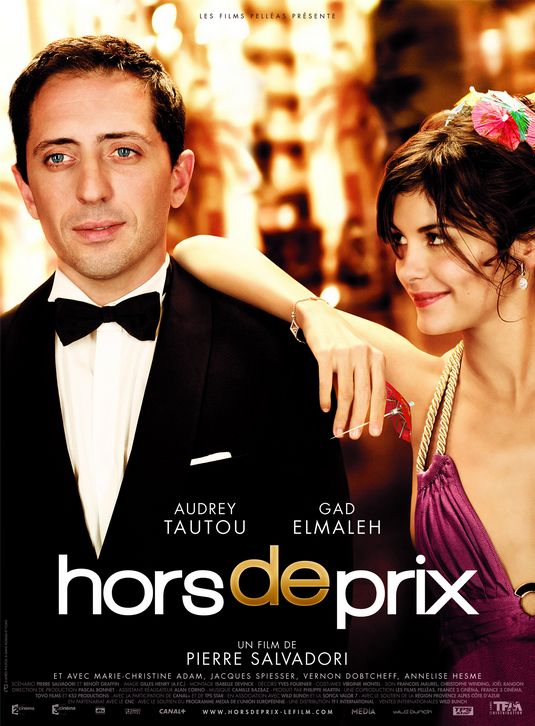
Literally translated, it means “outside of price.” Figuratively, it means “Priceless.” The title of the film plays with the idea of price, value, and money. What does it mean to have a price? Does money have an inherent value? How does money link with happiness?
Audrey Tatou and Gad Elmaleh both star in this romantic comedy where the answers to the previous questions are broached. Tatou plays Irene, an impatient, classy gold-digger hoping to score a guy who can set her up financially for the rest of her life. Unfortunately, she has a one night stand with a waiter Jean in a fancy hotel (Elmaleh) who she mistakenly believes is a high-roller baller. He is way out of her league, and in a comic scene, the rest of the hotel staff walks in on the couple and Jean’s real financial situation and occupation is revealed. Throughout the movie, Irene tries to get rid of Jean, but he remains dogged to win her back. The tables are turned when Jean finds himself in the inverse situation with a wealthy older woman, but it is clear that all he wants is Irene’s affections.
Two main ideas emerge regarding the overall questions. First, a warning is given to males about high maintenance women about their ability to take all of their money and then leave. Money is not enough to buy happiness in the long term, despite the fact that it might create an illusion of happiness in the short term. Love or affection, is “priceless,” something that cannot be bought. That doesn’t mean that love lacks value, it’s just that it’s “outside of price,” outside the means of paying. There must be something else that attracts two people together.
The second idea is that for those attracted to the idea of being a gold-digger, it really can pay, that is if you’re ok with selling your body and leaving a trail of broken hearts in your wake. Irene skillfully navigates this love battlefield and we see the sly maneuvers that she employs to exploit her relationships with well-off men. Perhaps you can’t buy happiness outright with money, but that doesn’t matter. You can get a huge amount of money from exploiting relationships, and there’s no reason to get to the next level – happiness. There is a certain challenge in this pursuit, and it can be satisfying in other ways.

Of course (to hammer home these themes) the real genius of the movie lies in the little tête à tête’s between the two main actors. Tatou proves to be a versatile actor (vis à vis her celebrated performance in Amelie), and Elmaleh’s control of his facial expressions is fascinating. Since the main themes of the film center on the psychological mechanisms of happiness and emotion, it makes sense that the film focuses on the verbal interactions between each other.
But what is remarkable and perhaps more subtle is the scène that the director chooses for his film. Most of the film is shot in a grand, luxurious hotel, and there is a certain amount of brand whoring. Watches, dresses, gold curtains … abound in the film. The effect is that at the end you leave the film with a sick feeling in your stomach, and a resolution not to enter into that ridiculous world. There must be easier and less risky ways of attaining the affection of others.
Finally, is there something “French” about the movie? Is this a typical French movie? According to the reviews on rottentomatoes.com, there is a “French froth” that pervades the film. The simple answer would be that the film is in French, set in France, and exploits the “French” ménage à trois. But, there are universal lessons in the film that can be applied to many other countries, cultures, and situations.
No comments:
Post a Comment